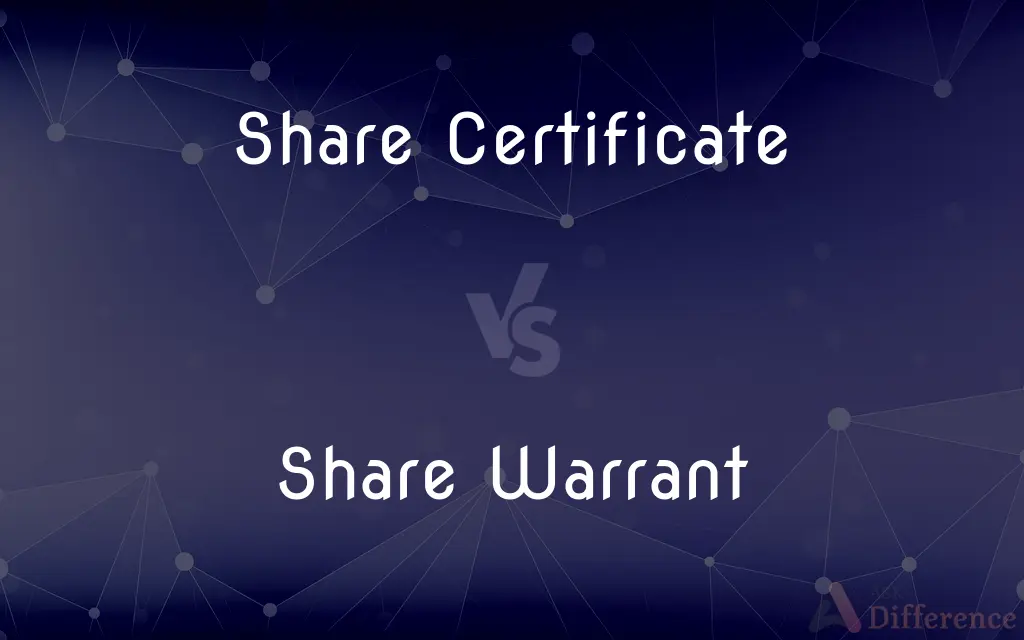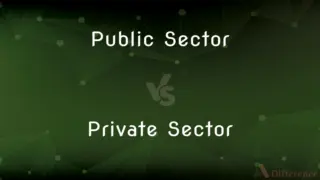Share Certificate vs. Share Warrant — What's the Difference?
By Tayyaba Rehman — Published on October 31, 2023
A Share Certificate is evidence of ownership in a company, while a Share Warrant is a document entitling the holder to acquire shares at a specific price.

Difference Between Share Certificate and Share Warrant
Table of Contents
ADVERTISEMENT
Key Differences
A Share Certificate is a vital document for shareholders as it certifies their ownership in a company. On the other hand, a Share Warrant doesn't imply ownership; instead, it provides the holder with an option to purchase shares in the future.
Share Certificates are generally non-transferable except through formal transfer procedures, ensuring the company keeps track of its shareholders. Share Warrants, however, can be freely traded in financial markets, similar to options.
The primary purpose of a Share Certificate is to establish and validate the holder's stake in a company. This is a proof of investment. A Share Warrant, by contrast, represents a future financial opportunity, potentially allowing the holder to acquire shares at an advantageous price.
It's important for shareholders to safeguard their Share Certificates, as these are proofs of their investment. Share Warrants, conversely, might be of value only if the conditions are favorable for exercising the warrant, thus turning it into actual shares.
Lastly, while a Share Certificate represents an already made investment, a Share Warrant is more of a promise or potential for future investment. The latter's value is often tied to the movement of the underlying company's share price.
ADVERTISEMENT
Comparison Chart
Nature
Proof of ownership
Option to buy shares
Transferability
Generally non-transferable
Freely traded
Purpose
Validates a shareholder's stake
Provides an opportunity to purchase shares
Relationship to Ownership
Represents current ownership
Represents potential future ownership
Dependence on Share Price
No direct dependence
Value might change with underlying share price
Compare with Definitions
Share Certificate
Legal proof of one's shares in a company.
The Share Certificate contained details like the number of shares and the date of issuance.
Share Warrant
A tradable option to acquire shares under set conditions.
Investors might buy a Share Warrant anticipating a company's growth.
Share Certificate
An official record of share ownership in a corporation.
Without the Share Certificate, proving ownership can be challenging.
Share Warrant
A financial instrument related to potential future share ownership.
Share Warrants can become valuable if the company's stock price rises significantly.
Share Certificate
A tangible affirmation of investment in a corporation.
Acquiring a Share Certificate is often the final step in the share purchase process.
Share Warrant
An option granting the holder the right to purchase shares in the future.
The Share Warrant gave Mary the flexibility to decide when to buy the shares.
Share Certificate
Evidence of a shareholder's stake in a business entity.
Tom stored his Share Certificate in a safe to ensure its security.
Share Warrant
Represents an opportunity to convert to shares at predetermined terms.
The terms of the Share Warrant specified the exercise price and the expiration date.
Share Certificate
A document certifying ownership of shares in a company.
Jane received her Share Certificate after buying 100 shares in ABC Corp.
Share Warrant
A document entitling the holder to buy shares at a specific price.
Using his Share Warrant, John bought shares at a rate lower than the current market price.
Common Curiosities
Is a Share Warrant an evidence of share ownership?
No, it's an option to buy shares at specific terms in the future.
Why would someone want a Share Warrant?
It offers an opportunity to buy shares at a potentially favorable price in the future.
What does a Share Certificate represent?
It represents proof of ownership in a company.
Are Share Warrants transferable?
Yes, they can be freely traded in financial markets.
What determines the value of a Share Warrant?
It's often tied to the movement of the underlying company's share price.
Is a Share Certificate needed to claim dividends?
While it proves ownership, dividends are usually linked to the registered ownership details with the company.
Can one sell their shares without the Share Certificate?
Typically, shares are registered electronically, but the certificate can be crucial for resolving disputes or proving ownership.
Can Share Certificates be easily traded?
Generally, no. They're typically non-transferable except through formal procedures.
Do Share Certificates have an expiration date?
No, they serve as perpetual proof of ownership unless the shares are sold.
Do all companies issue Share Certificates?
No, many modern companies use electronic registration, but Share Certificates are still common in certain contexts.
Can Share Warrants expire?
Yes, they often have an expiration date by which they must be exercised.
Can Share Warrants be converted into Share Certificates?
If exercised, warrants lead to the issuance of shares, which can then be represented by a Share Certificate.
How are Share Warrants different from stock options?
Both provide a right to buy shares, but warrants are issued by the company, while stock options are contractual agreements between parties.
Are Share Warrants common in all stock markets?
They are more prevalent in some markets than others, depending on regulatory and market practices.
What happens if a Share Certificate is lost?
Owners can usually get a replacement by proving ownership and possibly paying a fee.
Share Your Discovery

Previous Comparison
Thinking vs. Critical Thinking
Next Comparison
Public Sector vs. Private SectorAuthor Spotlight
Written by
Tayyaba RehmanTayyaba Rehman is a distinguished writer, currently serving as a primary contributor to askdifference.com. As a researcher in semantics and etymology, Tayyaba's passion for the complexity of languages and their distinctions has found a perfect home on the platform. Tayyaba delves into the intricacies of language, distinguishing between commonly confused words and phrases, thereby providing clarity for readers worldwide.














































